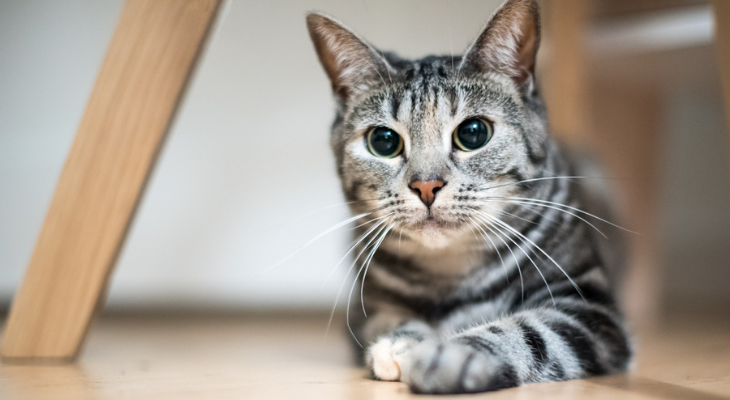
Your Cat's Different Pupil Sizes and What They Mean
Unlike humans, cats don't show their emotions on their faces, which may make it a little difficult to decipher your favorite feline's moods. Luckily, paying attention to subtle changes in your cat's eyes can help you tell if your pet is calm and happy or feeling a little frightened or anxious.
Changes in the Eyes Provide Important Information About Your Cat's Mood
The pupils provide important information about your cat's moods. Pupils, the dark openings inside your cat's colored irises, constrict and expand as the light changes. In dark areas, the pupils expand to allow more light into the eye. The openings get smaller in well-lit areas or bright sunlight.
Pupil size can also be an indication of your pet's mood. Changes in the appearance of the pupils or eyes can indicate:
- Pleasure. As your cat purrs on your lap, you may notice that its pupils become narrow slits. Narrowed pupils may be a sign that your pet is happy and content, particularly when accompanied by purring. Although purring often happens when cats are happy, some cats also purr when scared or in pain.
- Aggression or Anger. Pupils also tend to get smaller and narrower when your pet is feeling aggressive. Before your furry friend playfully pounces on a toy or lashes out at another pet, you'll notice a change in pupil size. Cats may also stare and squint if they're feeling aggressive. Squinting helps protect your cat's eyes from injury during a fight, according to Catster.
- Fear or Excitement. Wide eyes or pupils can be an indication that your pet is facing a scary or stimulating situation. You may have noticed that your cat's eyes widen when you turn on the vacuum or bring out the kitty fishing rod.
- Relaxation. Half-closed eyes and normal pupils mean your cat is feeling relaxed and comfortable in your company.
What Blinking Means
Have you ever noticed that your cat locks eyes with you then blinks slowly? Cat behavioral experts compare slow blinking to a kiss or smile from your cat. It's the way your cat shows affection. The next time you notice the slow blink, return the sentiment with your own leisurely blink.
Putting the Clues Together
Your cat's eyes aren't the only information you need to consider when you attempt to figure out your pet's mood. You'll also need to pay attention to:
- Posture
- Tail and ear position
- Vocalizations
Small pupils, flattened ears, an arched back, and a high tail with fur standing on end means your cat is angry and feels aggressive. In contrast, a neutral tail and erect ears coupled with normal or large pupils and neutral or relaxed posture are signs that your pet is confident and happy. Cats that feel threatened or anxious may hunch over and place their tails between their legs.
Is your cat's tail thumping back and forth furiously? That may be a sign that your feline wants you to stop the petting session immediately. If you disregard the warning, your pet might scratch you or wrap its teeth around your hand to make sure you understand the message.
The sounds your cat makes also provide information about its mood. By now, you can probably tell the difference between a happy meow and an agitated or aggressive one. Of course, growling is never a good sign and lets people or other animals know it's best to back away and give your pet some space.
Familiarizing yourself with the clues your cat's eyes provide will help you keep your cat healthy and happy. If you notice a sudden change in your pet's behavior, an illness or injury could be the reason. We can help you determine why your cat's behavior has changed and if there's a cause for concern. Contact us to schedule an appointment for your furry friend.
Sources:
Catster: Cat Pupils: Here’s What Your Cat’s Eyes Are Telling You, 10/15/19
